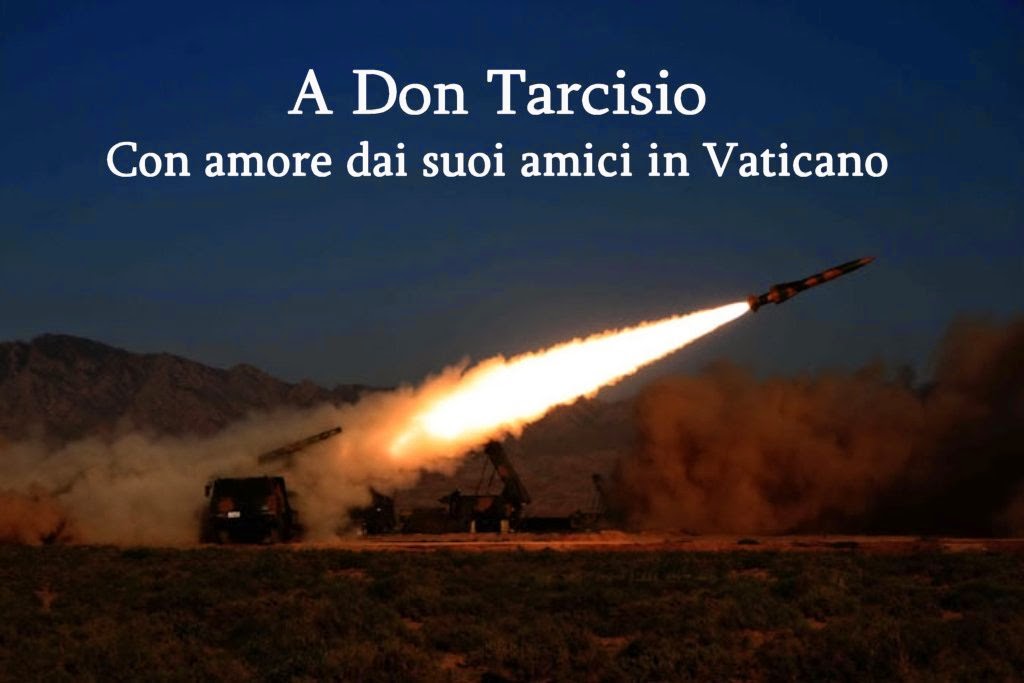Italian parish priest deemed crazy for dissenting from the new orthodoxy on communion for the divorced and remarried
In exalted ecclesiastical circles in Italy, there seems to be a new orthodoxy emerging with regard to the question of Holy Communion for the divorced and remarried. So strict is it that a parish priest gets a guided missile from the heart of the curia for his dissent.
Many readers follow Sandro Magister's English language blog, Chiesa, for its well-informed and incisive comment on Vatican affairs. Magister also writes an Italian language blog for L'Espresso, called Settimo Cielo which often has additional material of great interest.
A few days ago, in his article Cose da pazzi. Il cardinale Collins e il curato di campagna ("Crazy things. Collins and the country priest") Magister told of the reaction to Fr Tarcisio Vicario, a parish priest of the diocese of Novara in Italy who recently spoke about the question of Holy Communion for the divorced and remarried, saying:
"For the Church, which acts in the name of the Son of God, marriage between the baptised is alone and always a sacrament. Civil marriage and cohabitation are not a sacrament. Therefore those who place themselves outside of the Sacrament by contracting civil marriage are living a continuing infidelity. One is not treating of sin committed on one occasion (for example a murder), nor an infidelity through carelessness or habit, where conscience in any case calls us back to the duty of reforming ourselves by means of sincere repentance and a true and firm purpose of distancing ourselves from sin and from the occasions which lead to it."The Bishop of Novara made it clear that an appeal to logic or the proper understanding of rehtorical analogy, would fall on deaf ears, characterising the priest's expression as:
"an unacceptable equation, even though introduced as an example, between irregular cohabitation and murder. The use of the example, even if written in brackets, proves to be inappropriate and misleading, and therefore wrong."In fact Fr Vicario did not "equate" irregular cohabitation and murder. His whole point was that they are different - one is a permanent state where the person does not intend to change their situation, the other is a sin committed on a particular occasion where a properly formed conscience would call the person to repent and not commit the sin again.
The wrath descending upon poor Fr Vicario did not end with a rebuke from his Ordinary. Cardinal Baldisseri, the Secretary General of the forthcoming Synod, said that the words of Fr Vicario were "crazy, a strictly personal opinion of a parish priest who does not represent anyone, not even himself." ("una pazzia, un’opinione strettamente personale di un parroco che non rappresenta nessuno, neanche se stesso.")
Leaving aside the tortuous hyperbole (as Sir Bernard Wooley might interject, his opinion cannot be personal yet not represent himself) it must be asked why such a mainstream and orthodox opinion, expressed with clarity, should be the object of such vehement condemnation.
Sandro Magister's article makes a pertinent comparison between the words of the Italian country priest and those of Cardinal Collins, Archbishop of Toronto, who was appointed in January this year as one of the five members of the Commission of Cardinals Overseeing the Institute for the Works of Religion.
A week ago, on the eve of the publication of the Instrumentum Laboris for the Synod, Brandon Vogt interviewed Cardinal Collins for the Word on Fire blog. During the course of the interview, Cardinal Collins said:
Many people who are divorced, and who are not free to marry, do enter into a second marriage. There are various reasons that can lead to this, and their fellow parishioners should not occupy themselves speculating about them. Catholics in that tragic situation can be involved in many ways in the life of the community, but they may not receive the sacraments, such as Holy Communion, since whatever their personal disposition is or the reasons for their situation, known perhaps only to God, they are continuing in a way of life which is objectively against the clear command of Jesus. That is the point. The point is not that they have committed a sin; the mercy of God is abundantly granted to all sinners. Murder, adultery, and any other sins, no matter how serious, are forgiven by Jesus, especially through the Sacrament of Reconciliation, and the forgiven sinner receives communion. The issue in the matter of divorce and remarriage is one’s conscious decision (for whatever reason) to persist in a continuing situation of disconnection from the command of Jesus. Although it would not be right for them to receive the sacraments, we need to find better ways to reach out to people in this situation, to offer them loving assistance.Sandro Magister is quite right to point out that Cardinal Collins did not say anything different from Fr Vicario. And he is quite right to ask whether he too is to be accused of being crazy.
By way of a postscript, did you notice that there seems to be a slide forming? Are we now no longer limited to considering Holy Communion for the divorced and remarried, but widening the question to all "irregular cohabitation"? I hope that the higher ecclesiastics consider the pastoral question of how long couples have to be cohabiting before they can receive Holy Communion? Parish priests such as myself and Fr Vicario need to know where the line is to be drawn.
I suppose everyone might agree that a one-night stand is not sufficient (though who knows what might be proposed by the real crazies in this debate?) But would a few weeks of shacking-up with the girlfriend or boyfriend, moving in your Playstation and bagging a few drawers for your clothes, put you in a fit state to receive Holy Communion?



